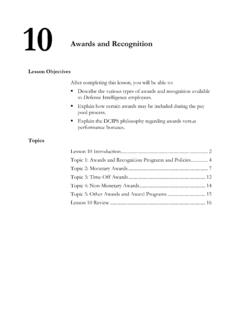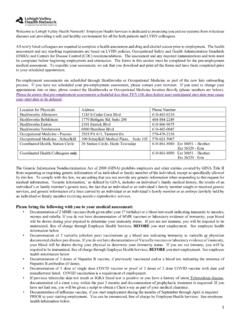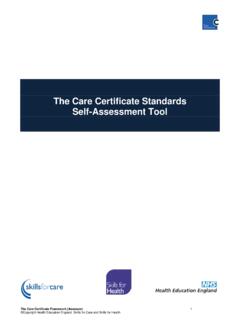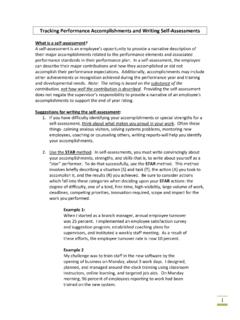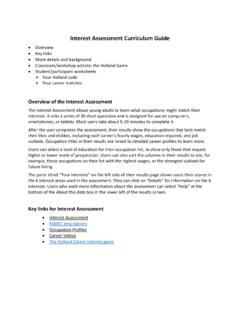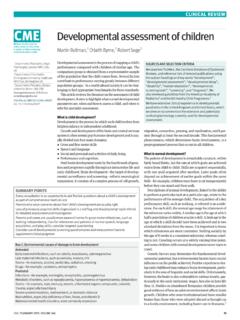Transcription of Using Action Verbs when writing your Self-Assessment
1 Using Action Verbs when writing your Self-Assessment writing effective Objectives and Assessments Spring 2010 Incorporating verbiage in your Self-Assessment that fully and accurately describes your accomplishments is important in order to foster a mutual understanding between you and your rating official/supervisor about your performance. This understanding on your contributions over the evaluation period can set the stage for a discussion about what you achieved and how you achieved it.
2 Using Action Verbs can make it easier for you to address each of your job objectives and elements and make the information clearer and more concise for your rating official/supervisor. Below are tips and examples of Action Verbs you might use for capturing accomplishments associated with your objectives and performance elements. Tips Use clear, concise statements written in the first person, active voice. Put the " Action " verb and the "doer" of the Action at the beginning of the sentence. Avoid Using passive verb forms often found at the end of long sentences.
3 Avoid Using - they - them - plan - agencies - organizations - or other such "generic words" without first specifying who or what you are writing about. Avoid bureaucratic buzzwords. Spell out acronyms the first time they are used on a page, but avoid Using them excessively. Use words that highlight how you accomplished your objectives and how you contributed to the team/organizational effort. Avoid statements that describe your personal beliefs or philosophies; focus on specific challenges and results achieved through your actions and/or leadership.
4 Quantify and provide examples as evidence of your accomplishments. Avoid repeated use of the same example. Include recent education and training that enhanced your skills. Include special assignments ( , details, task forces, committees). Examples of Action Verbs Action Verbs are provided below, Using the standard performance elements as categories because they apply to all DCIPS employees. These categories can also aid in identifying Action Verbs supportive of individual SMART objectives. Accountability for Results Administer, Adopt, Advise, Analyze, Anticipate, Appraise, Approve, Arrange, Assemble, Assign, Assume, Assure, Authorize, Calculate, Circulate, Clean, Clear, Collaborate, Collect, Compile, Concur, Conduct, Confer, Consolidate, Construct, Consult, Control, Coordinate, Correlate, Correspond, Debug, Delegate, Deliver, Design, Determine, Develop, Devise, Direct, Discuss, Dispose, Disseminate, Distribute, Draft.
5 , Endorse, Establish, Estimate, Evaluate, Execute, Exercise, Exert, Expedite, Formulate, Furnish, Implement, Improve, Initiate, Inspect, Install, Interpret, Investigate, writing effective objectives and self assessments Spring 2010 2 Issue, Maintain, Monitor, Notify, Operate, Participate, Perform, Place, Plan, Practice, Prepare, Proceed, Process, Promote, Propose, Provide, Recommend, Repair, Represent, Report, Research, Review, Revise, Schedule, Secure, Select, Sign, Sort, Specify, Stimulate, Submit, Supervise, Train, Transcribe, Verify, Write.
6 Communication Address, Advertise, Arbitrate, Arrange, Articulate, Author, Clarify, Collaborate, Communicate, Compose, Condense, Confer, Consult, Contact, Convey, Convince, Correspond, Debate, Define, Develop, Direct, Discuss, Draft, Edit, Elicit, Enlist, Explain, Express, Formulate, Furnish, Incorporate, Influence, Interact, Interpret, Interview, Involve, Join, Judge, Lecture, Listen, Market, Mediate, Moderate, Negotiate, Observe, Outline, Participate, Persuade, Present, Promote, Propose, Publicize, Reconcile, Recruit, Refer, Reinforce, Report, Resolve, Respond, Solicit, Specify, Speak, Suggest, Summarize, Synthesize, Translate, Write.
7 Critical Thinking Act, Adapt, Begin, Combine, Compose, Conceptualize, Condense, Create, Customize, Design, Develop, Direct, Display, Draw, Entertain, Establish, Fashion, Formulate, Find, Illustrate, Initiate, Institute, Integrate, Introduce, Invent, Model, Modify, Originate, Perform, Plan, Revise, Revitalize, Shape, Solve. Engagement and Collaboration Add, Advise, Aid, Anticipate, Arrange, Assess, Assist, Attend, Create, Counsel, Construct, Contribute, Deliver, Demonstrate , Design, Develop, Discover, Elaborate, Encourage , Export, Facilitate, Find, Help, Improve, Generate, Guide, Lead, Mediate, Motivate, Organize, Represent, Start, Serve, Unify, Unite.
8 Personal Leadership and Integrity; Leadership Administer, Analyze, Appoint, Approve, Assign, Attain, Authorize, Chair, Consider, Consolidate, Contract, Control, Convert, Coordinate, Decide, Delegate, Develop, Direct, Eliminate, Emphasize, Enforce, Enhance, Establish, Execute, Generate, Handle, Head, Hire, Host, Improve, Incorporate, Increase, Initiate, Inspect, Institute, Lead, Manage, Merge, Motivate, Navigate, Organize, Originate, Overhaul, Oversee, Plan, Preside, Prioritize, Produce, Recommend, Reorganize, Replace, Restore, Review, Schedule, Secure, Select, Streamline, Strengthen.
9 Supervise, Terminate. Managerial Proficiency Achieve, Administer, Analyze, Appoint, Approve, Assign, Attain, Authorize, Chair, Conceive, Consider, Consolidate, Contract, Control, Convert, Coordinate, Decide, Delegate, Develop, Direct, Eliminate, Emphasize, Encourage, Enforce, Enhance, Establish, Evaluate, Execute, Improve, Generate, Handle, Head, Hire, Host, Implement, Improve, Incorporate, Increase, Initiate, Inspect, Inspire, Institute, Launch, Lead, Manage, Merge, Motivate. Navigate, Organize, Originate, Overhaul, Oversee, Plan, Preside, writing effective objectives and self assessments Spring 2010 3 Prioritize, Produce, Recommend, Reevaluate, Reject, Reorganize, Replace, Report, Restore, Review, Schedule, Secure, Select, Streamline, Strengthen, Supervise, Terminate, Unite.
10 Technical Expertise Activate, Adapt, Alter, Analyze, Apply, Approve, Arrange, Assemble, Build, Calculate, Catalogue, Clarify, Classify, Collect, Compare, Compute, Compile, Conduct, Conserve, Construct, Convert, Critique, Debug, Describe, Design, Detect, Determine, Develop, Diagnose, Dispatch, Edit, Engineer, Evaluate, Examine, Execute, Experiment, Explore, Extract, Fabricate, Formulate, Fortify, Gather, Generate, Implement, Inspect, Install, Interview, Invent, Investigate, Locate, List, Maintain, Measure, Monitor, Observe, Operate, Organize, Overhaul, Prepare, Print, Program, Process, Proofread, Rectify, Record, Reduce, Regulate, Remodel, Repair, Replace, Research, Restore, Retrieve, Review, Search, Screen, Solve, Specify, Specialize, Standardize, Streamline, Study, Summarize, Survey, Systematize, Upgrade, Utilize.




